While the MLS regular season is almost finished, many teams are still fighting to either keep or win a playoff spot. Before their match, both Portland Timbers and Sporting KC sat just outside the Western Conference’s top seven. With Portland in eighth and Sporting KC in ninth, the game was a must-win for both teams.
In the end, Portland Timbers managed to overcome a 0-1 deficit to win the game 2-1 in stoppage time. The win pushed them past LA Galaxy and FC Dallas and into a playoff spot. Sporting KC remain in ninth place. This tactical analysis will explain how Portland Timbers managed to win the game.
Lineups
Regular readers of TFA will know that this section usually includes a Wyscout graphic showcasing both teams’ lineups. Unfortunately, an accurate graphic for this game was unavailable. Instead, I will do my best to outline how the two teams lined up.
Portland Timbers’ head coach, Giovanni Savarese, lined up in a 4-3-3. While the shape of this formation changed during the match, it looked something like this:
GK: Steve Clark (#12)
RB: Jorge Moreira (#2) – CB: Bill Tuiloma (#25) – CB: Claude Dielna (#5) – LB: Jorge Villafaña (#4)
CM: Andy Polo (#11) – CM: Diego Chará (#21) – CM: Eryk Williamson (#30)
CAM: Diego Valeri (#8)
RF: Dairon Asprilla (#27) – LF: Jeremy Ebobisse (#17)
Sporting KC’s head coach, Peter Vermes, opted for a 4-1-4-1. His team took this shape:
GK: Tim Melia (#29)
RB: Graham Zusi (#8) – CB: Graham Smith (#16) – CB: Matt Besler (#5) – LB: Luís Martins (#36)
CDM: Ilie Sánchez (#6)
RM: Gerso Fernandes (#12) – CM: Benny Feilhaber (#30) – CM: Roger Espinoza (#17) – LM: Dániel Sallói (#20)
ST: Erik Hurtado (#19)
Portland Timbers’ Buildup
In transition, Portland Timbers were patient in possession. When fullbacks Jorge Moreira and Jorge Villafaña pushed up into wide areas, centre backs Bill Tuiloma and Claude Dielna spread, creating space for Diego Chará to drop and receive the ball.
Diego Valeri, Dairon Asprilla and Jeremy Ebobisse overloaded the centre of the field, ensuring Sporting KC’s defenders remained compact. This allowed Portland’s high and wide fullbacks to receive the ball and attack the space or circulate possession.
In transition, Chará would often look to hit his fullbacks if the pass was on. If no pass was available. Chará was able to circulate the ball between his centre backs and two central midfield partners, Andy Polo and Eryk Williamson. This resulted in a more patient approach to the game and Portland Timbers achieving 60 percent of the game’s possession.
We can see the beginning of Portland’s build-up in the images below. Chará drops between Tuiloma and Dielna to receive the ball. He can either maintain possession with his centre backs or play a ball direct to his fullbacks further up the field. Left-back Villafaña can be seen highlighted in red, while right-back Moreira is high and wide out of the frame.
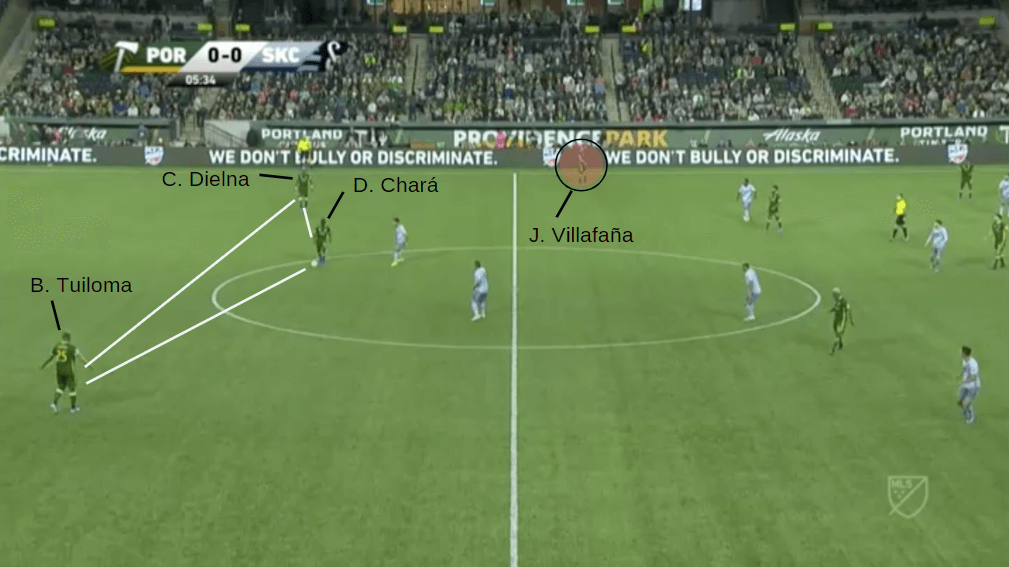
If the ball was played into Chará, he was able to turn into space and find a passing option higher up the field. He would often look to hit the wide channels. In the images below, we can see Chará hitting both fullbacks in quick succession while in possession just past the halfway line.
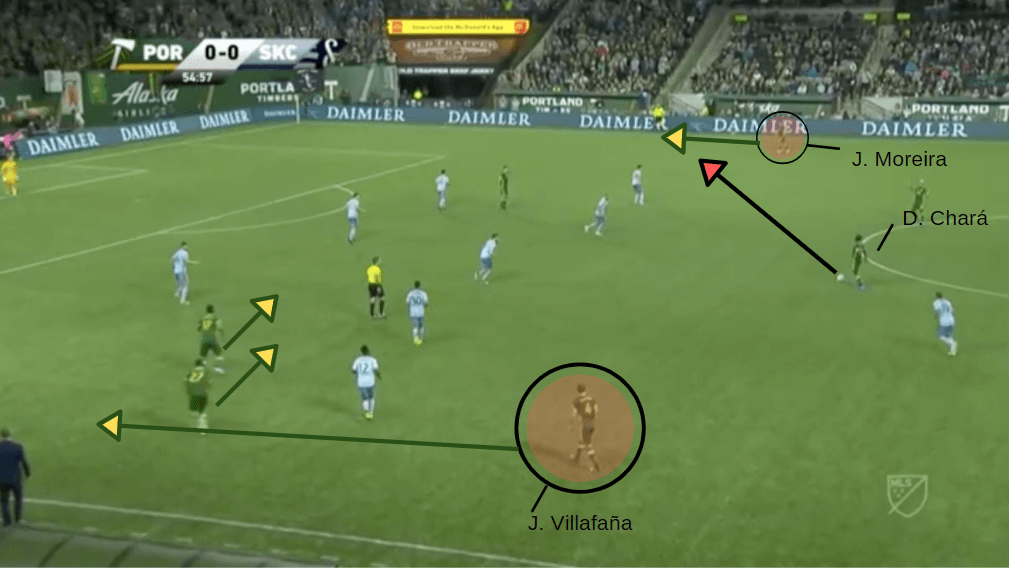
In the above image, Chará plays a lobbed ball into space for Moreira. This causes Sporting KC to shift to towards that side of the field. Moreira dribbles the ball backwards and passed to Chará again who switched the ball to the other side to Villafaña who made his run up the field before Chará had made his initial pass to Moreira.
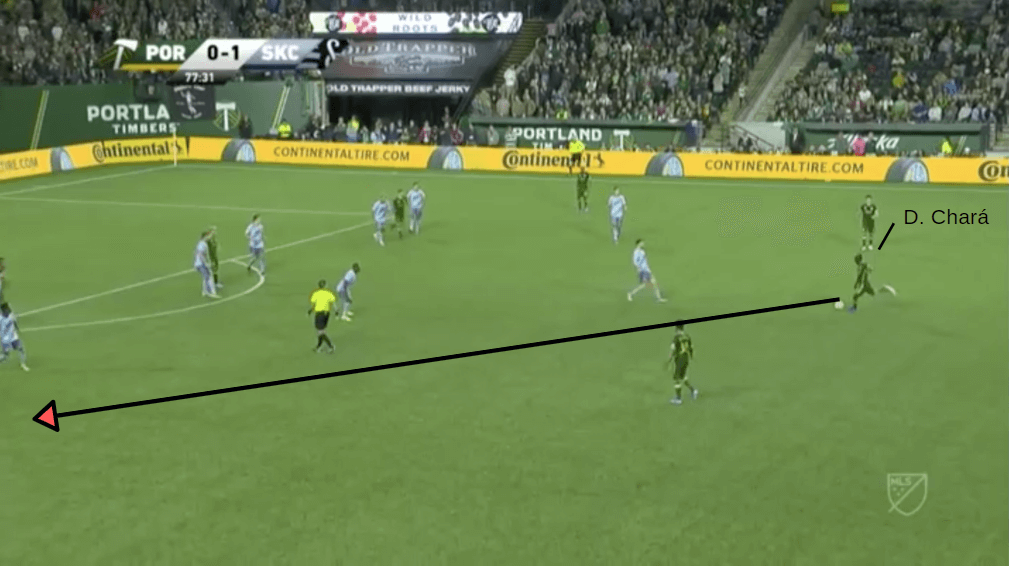
Portland’s fullbacks were integral to this plan. Their positioning up the field provided width in the attack. Chará’s positioning helped provide depth, allowing Portland to circulate the ball as shown in the above sequence.
If the ball was progressed in a wider area, Chará’s positioning allowed him to provide a central option for his teammates. In the following image, we can see Portland’s centreback, Tuiloma, play the ball forward to Andy Polo. Polo plays the ball back into Chará who is able to switch the point of attack by playing out to the left.
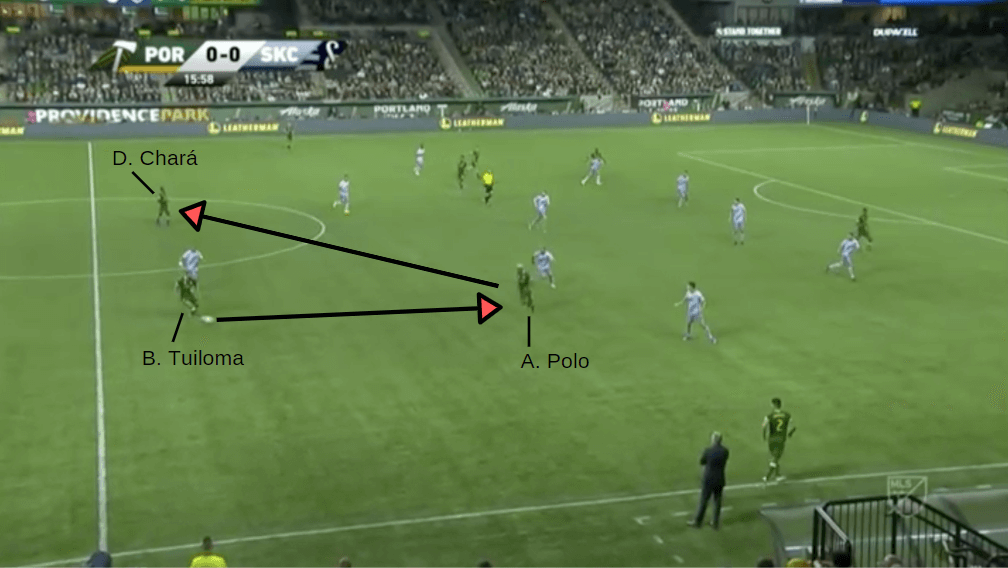
When Portland possessed the ball in their own half, Chará was almost always a free option. Sporting KC were unable to effectively take the central midfielder out of the game and allowed passes to be played into him without pressuring him. This building out of the back helped achieve greater possessional figures, but it wasn’t until much later in the game when Portland managed to score a goal.
Portland Timbers’ Fullbacks
As discussed in the previous section, Portland’s fullbacks were an important part of their offensive play. When the Timbers began their attack, both Moreira and Villafaña quickly got into high areas to provide width. This, in part, was due to Portland having no out-and-out wide players in their attacking lineup.
By committing their fullbacks to the attack, Portland’s out-and-out attackers were able to take up more central positions, closer to the goal. Diego Valeri had the license to roam from his central area to help link up with Portland’s fullbacks, as we can see below.
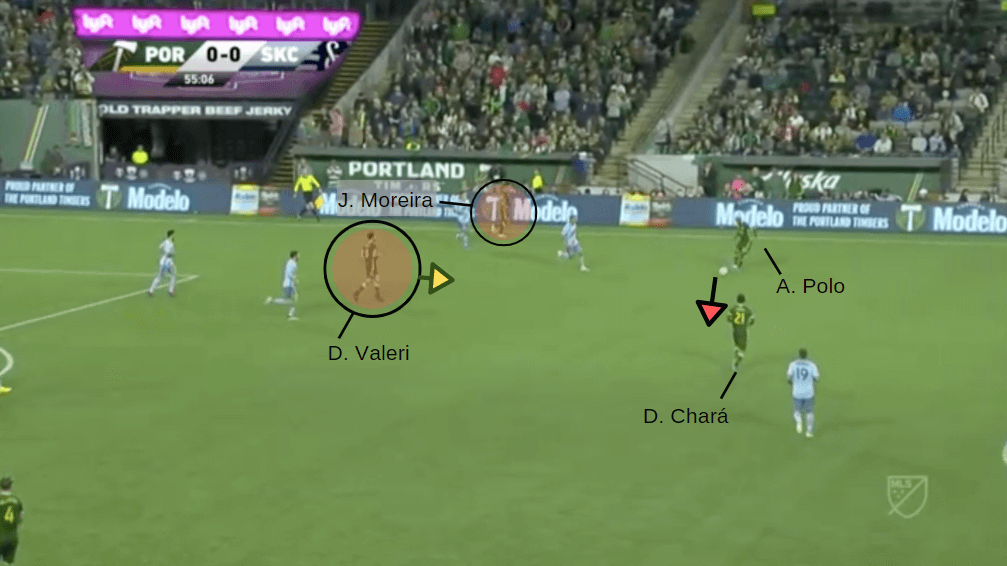
While their buildup was usually more patient and methodical, the high fullbacks also allowed Portland to quickly transition up the field on the counter. With Sporting KC taking up a narrow defensive shape, there was lots of space on the opposite side of the field. Here was can see a quick transition down the left side of the field create tons of space for Moreira to attack.
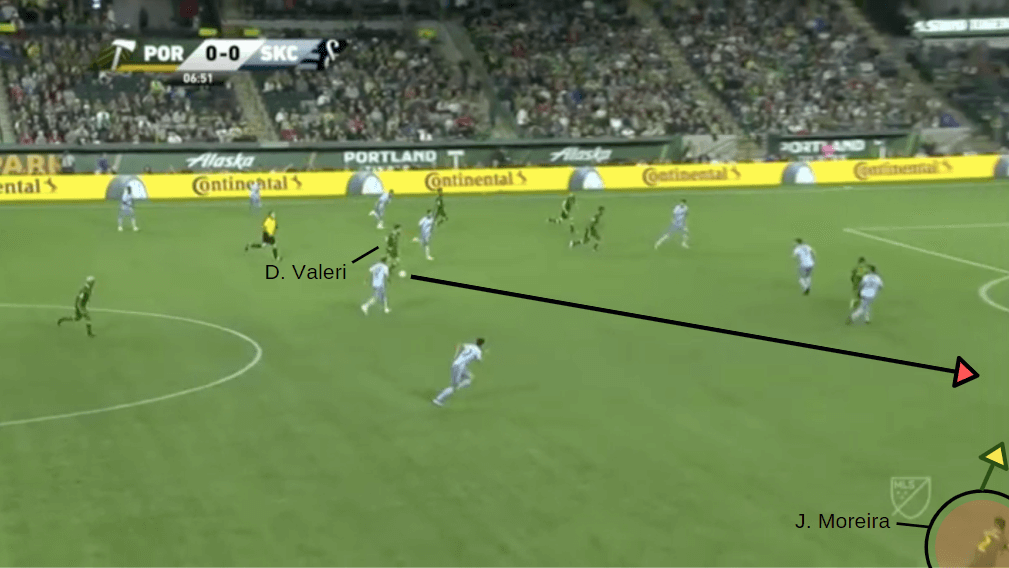
A pass from Valeri finds the run of Moreira, who attacks the space and forces a great save from Tim Melia. Without the high positioning of Portland’s fullbacks, their progression up the field would have been severely limited.
Diego Valeri
As well as creating width with their fullbacks, Diego Valeri also had an important role going forward for the Portland Timbers. With there being no out-and-out attackers on the wings, Valeri shifted from left to right in an attempt to help link up the play on the flanks. He would occupy areas in the halfspace, forcing defenders to either leave him free or sacrifice central solidity. We saw Valeri supporting his fullbacks in the first image of the previous section of this match analysis.
For both of Portland’s goals, Valeri had different, but equally important role from the half-space. During the first goal, we see Valeri move through the halfspace to a wide area, pulling defenders out to mark him. Chará bursts into the empty pocket in the half-space created by Valeri’s run and Marvin Loría is able to play him through on the counter.
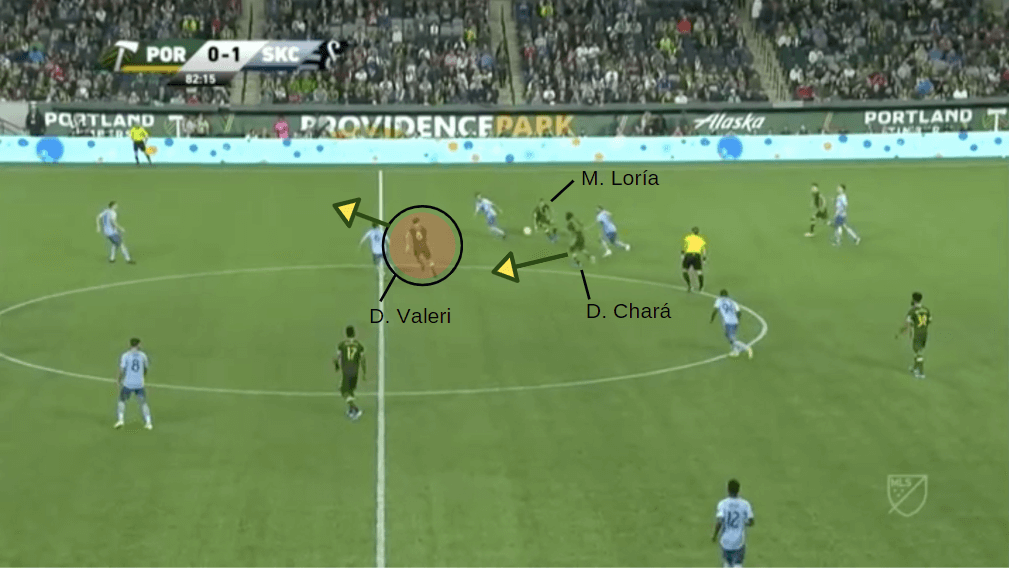
By shifting out wide from his central area, Valeri stretches the Sporting KC defensive line. This allows his teammates to exploit the spaces left. Chará’s run resulted in a goal after the midfielder passed the ball across the six-yard box to an unmarked Jeremy Ebobisse.
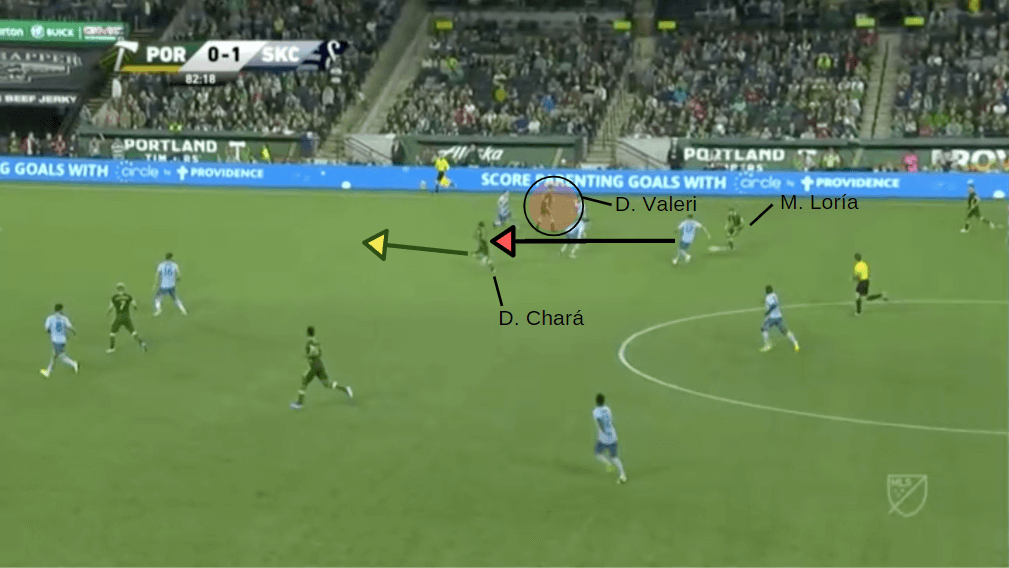
For Portland’s second goal, Valeri makes a run into the half-space behind Sporting KC’s left-back from a more central location. His run drags centre back Graham Smith out of position. He receives the ball and is able to outsmart Smith with some clever footwork to play a brilliant ball back post.
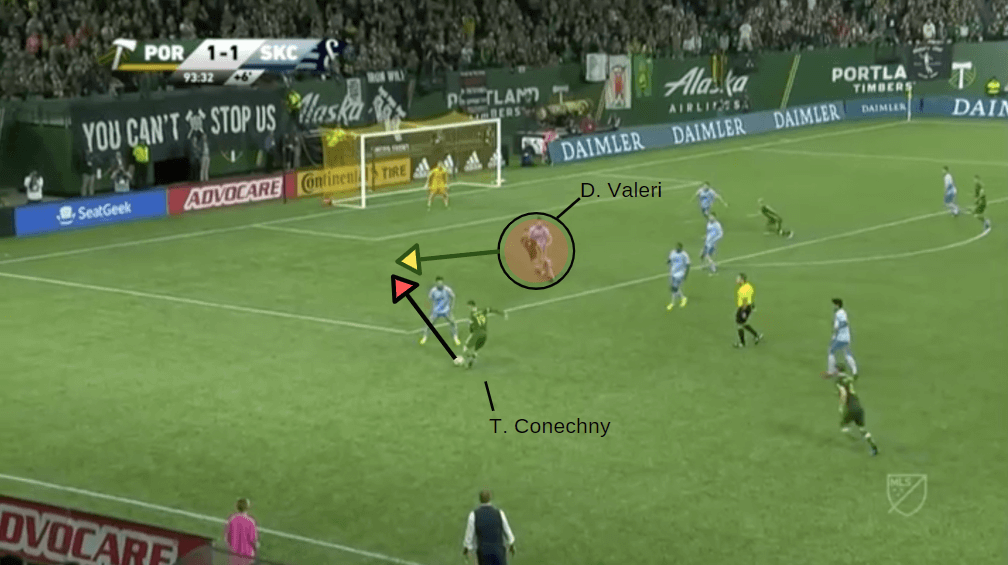
The combination of Valeri’s horizontal movements and Portland’s fullbacks’ high positioning was vital to their offensive setup. The combination of the two provided options both out wide and centrally for the Timbers, and eventually helped them break down Sporting KC’s defence. The previous images show Valeri’s influence on both sides of the field.
Portland Timbers’ Counter Press
After losing the ball, Portland immediately looked to win possession back. They pressed high up the field in an attempt to force turnovers from Sporting KC. The high pressure prevented Sporting KC from building out from the back, forcing them to play much more direct in their build-up. We can see this high press in the images below.
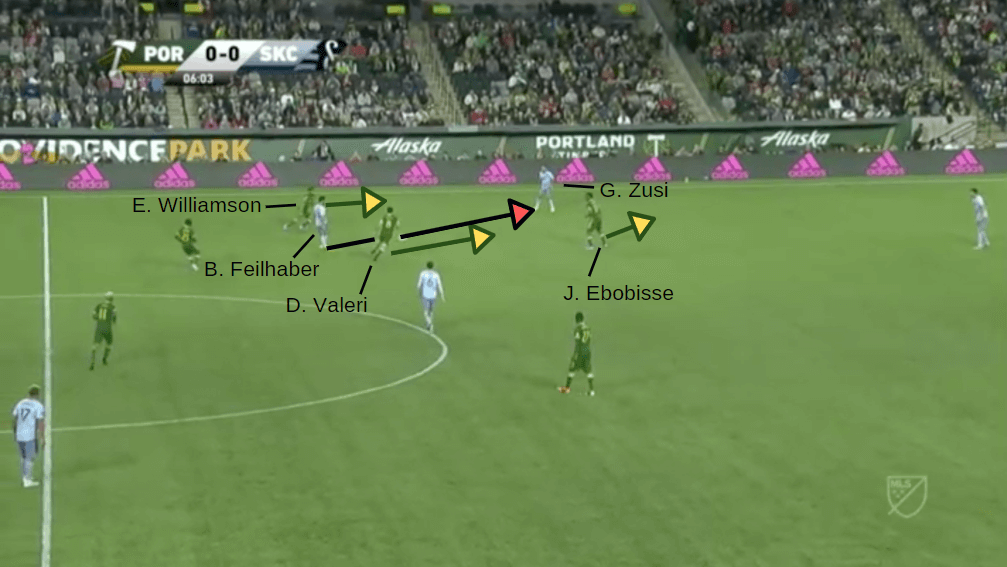
After pressing Zusi, he had no option but to play backwards. Ebobisse allows the pass to be played back to Sporting KC’s centre back, although he was nearly in a position where he could have intercepted the pass. After the ball was played to the centre back, Sporting KC lobbed the ball up the field and gave away possession. This led to the Moreira shot on goal shown previously in this analysis.
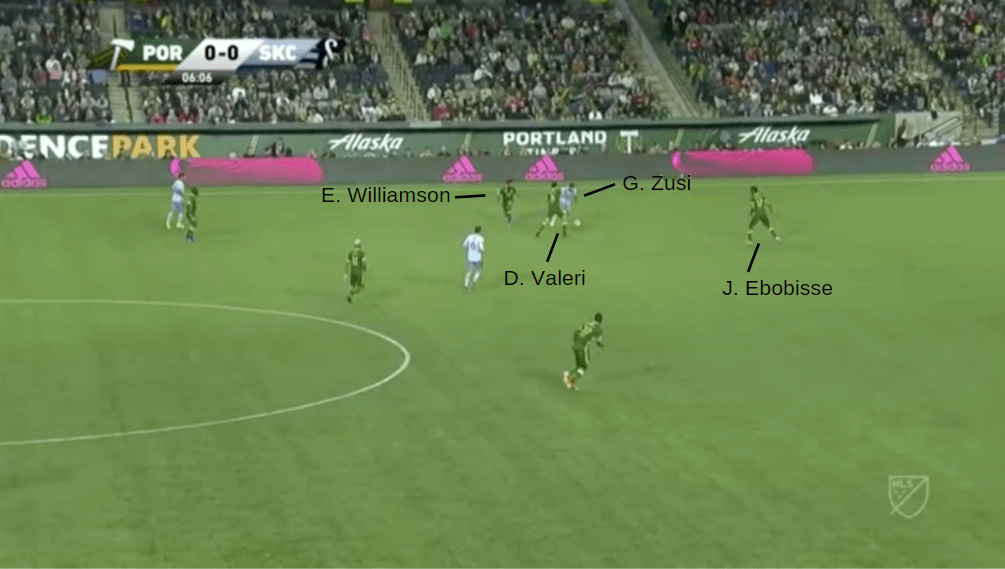
The press, on many occasions, resulted in turnovers deep into Sporting KC’s defensive half. It also slowed down Sporting’s attempt to build up quickly, forcing them to play backwards. The press, however, was occasionally beaten. With Portland’s fullbacks so high up the field, it made it easy for Sporting KC to break down the flanks with direct balls or passing sequences. This resulted in a few good chances for Sporting, however, these chances weren’t taken. We can see an example of Sporting KC taking advantage of Portland’s high fullbacks below.
In the second half, Sporting were able to progress the ball down the left side of the field by beating the press of Portland’s right back. When Sporting KC attempted to build up from the back, Jorge Moreira pressed the ball carrier. This created space in behind to be exploited.
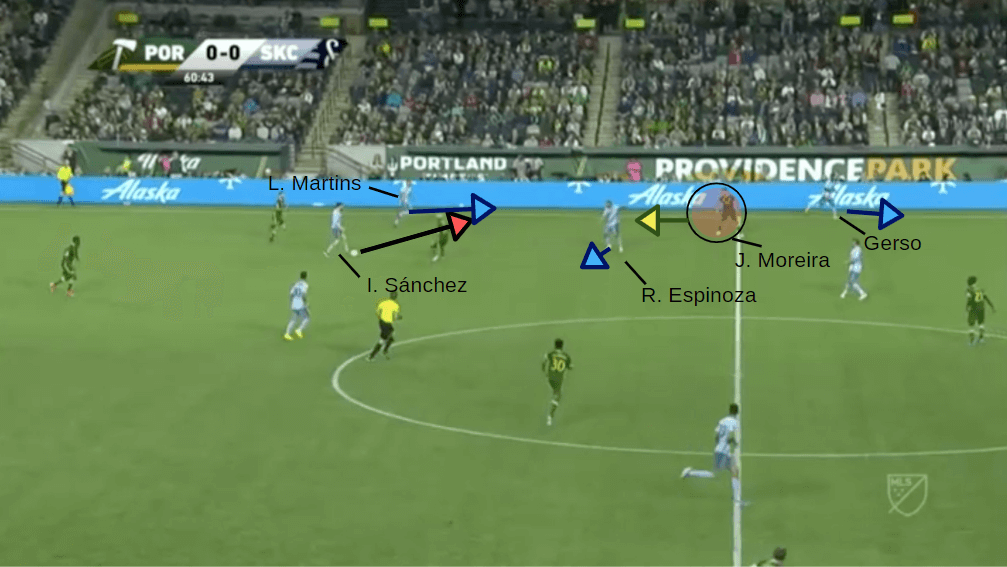
As Ilie Sánchez plays a ball to Luís Martins, Jorge Moreira presses the receiver. As he does, Espinoza shifts his position so he can receive a pass from Martins on the half turn. Gerso recognises the space available and makes a run down the line.
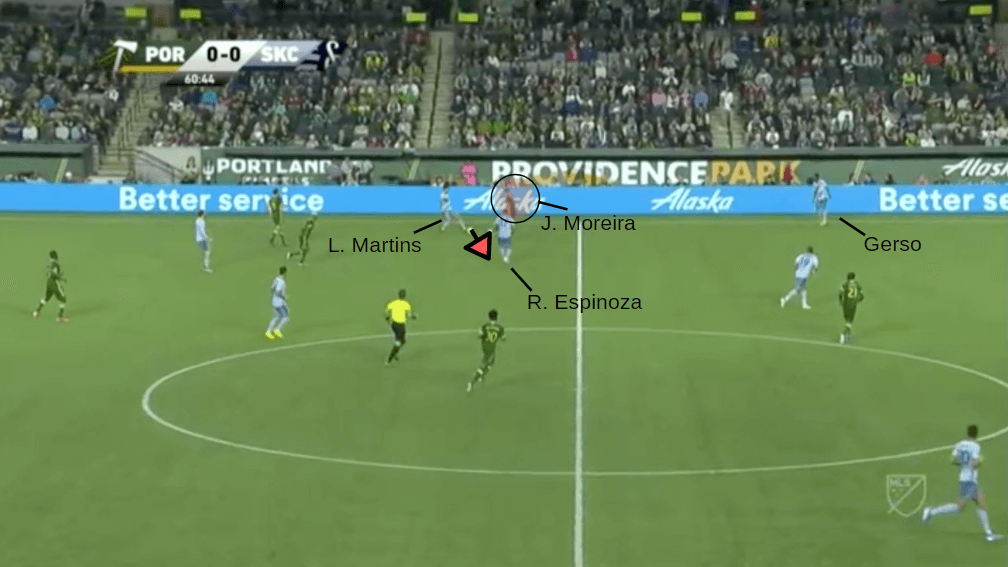
Martins is able to beat Moreira’s press by playing a pass into Espinoza. Espinoza is able to play a pass into space for Gerso, who is unmarked. The initial step by Moreira leaves Portland’s wide area exposed to the run of Gerso.
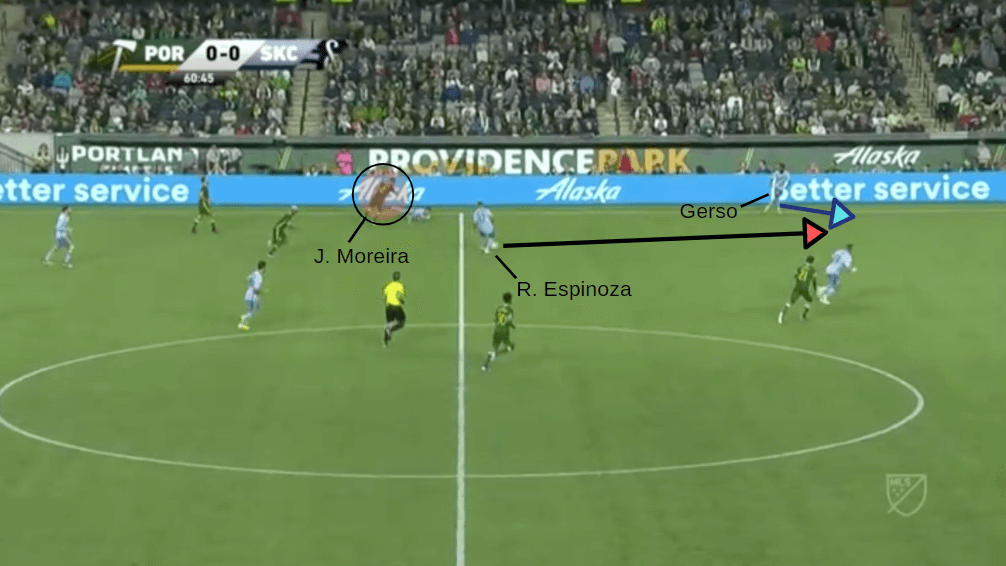
This scenario resulted in a dangerous cross that caused problems for the Timbers. Around 10 minutes after this scenario, Sporting KC broke down the line again. This time they hit the post, nearly doubling their lead.
On other occasions, Portland’s press was too flat. After failing to win the ball on the counter-press, Portland revetted back to a more reserved defensive formation with bodies behind the ball. Then, as Sporting KC progressed the ball, they committed players forward to press the ball carrier.
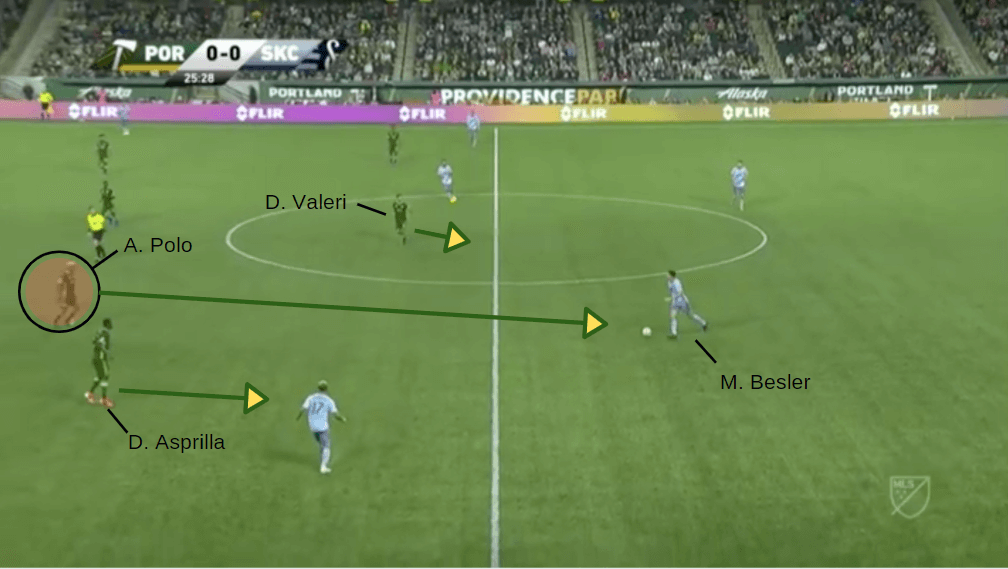
When Sporting KC possessed the ball in deeper areas, it wasn’t uncommon for Portland Timbers to send an additional midfielder to help press. Above, Matt Besler possesses the football in space, prompting Andy Polo to step out of his midfield position and press him.
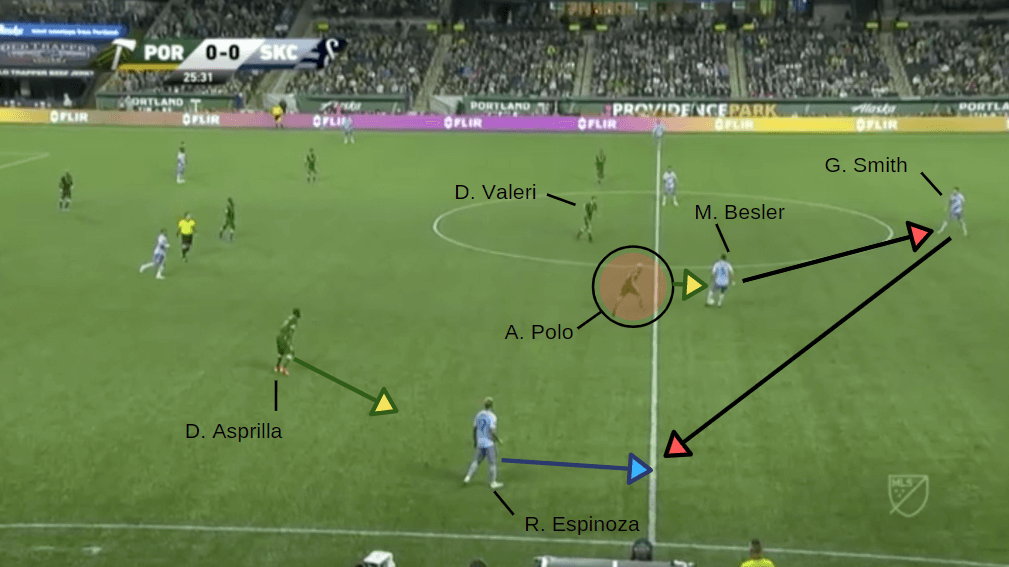
The press forces Besler to play the ball back to Graham Smith. Roger Espinoza drops on the left side of the field to receive the pass. Dairon Asprilla is able to press Espinoza, but Polo’s initial press leaves space behind him for Sporting KC to progress the football.
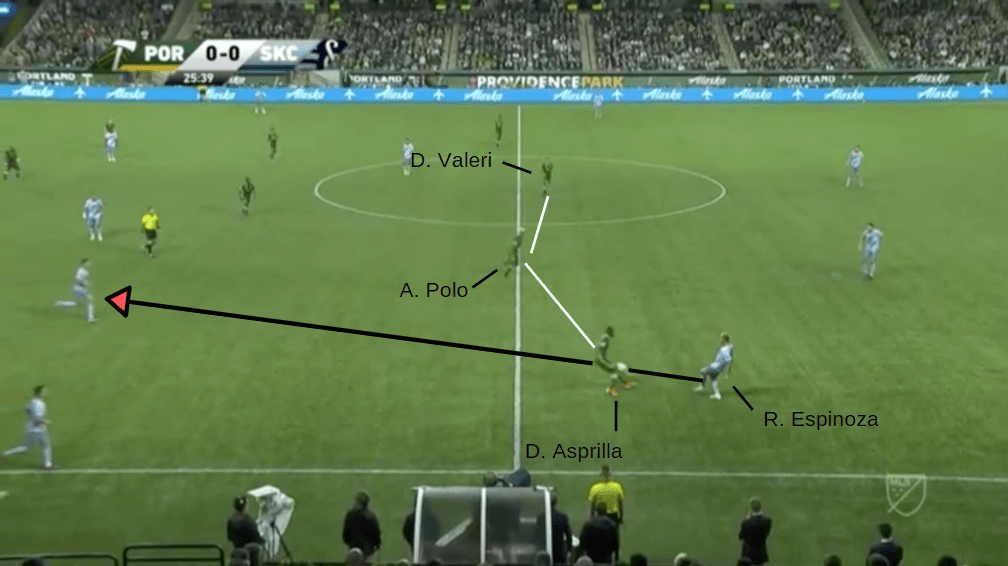
As shown in the above image, the pressing line was too falt, allowing Sporting to create passing options that could break the press easily. Despite being able to break the initial press, however, Sporting KC were unable to progress the ball past the remaining Portland defenders. It was a fluke cross that sailed over Steve Clark’s head that eventually broke the deadlock and put the visitors up 0-1.
Conclusion
Portland Timber’s tactics over 90+ minutes helped them claw back a victory against Sporting KC. The win is vital for their playoff hopes and has put their fate in their own hands. Sporting KC, on the other hand, need multiple teams to drop points if they want to extend their season beyond the regular 34 MLS games.
Both teams have some tricky fixtures ahead and are even set to play face off one last time in the 2019 MLS regular season on September 29. Sporting KC will be looking for redemption when they host the Portland Timbers in their penultimate regular-season game.

If you love tactical analysis, then you’ll love the digital magazines from totalfootballanalysis.com – a guaranteed 100+ pages of pure tactical analysis covering topics from the Premier League, Serie A, La Liga, Bundesliga and many, many more. Buy your copy of the August issue for just ₤4.99 here.

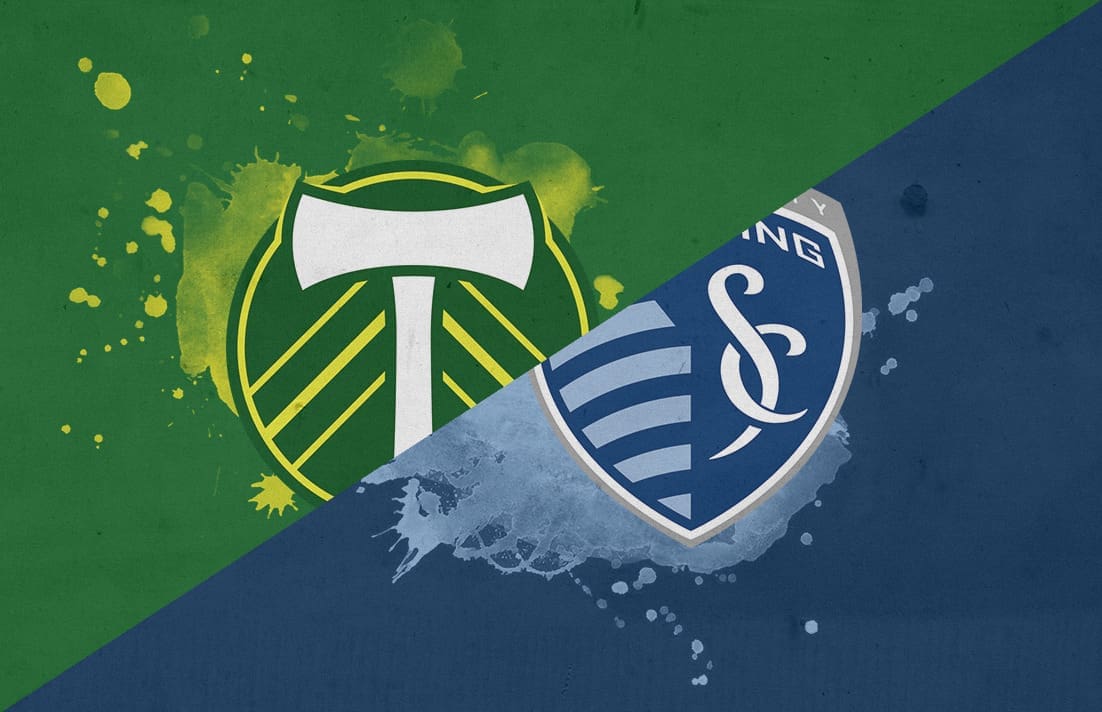
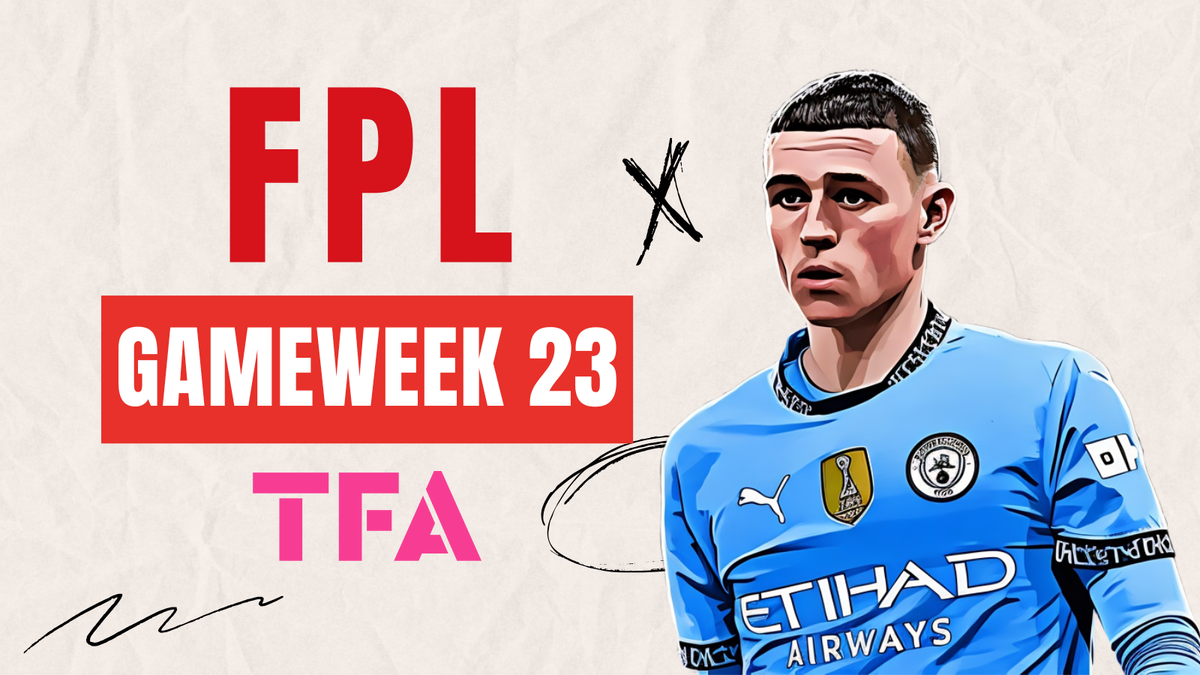
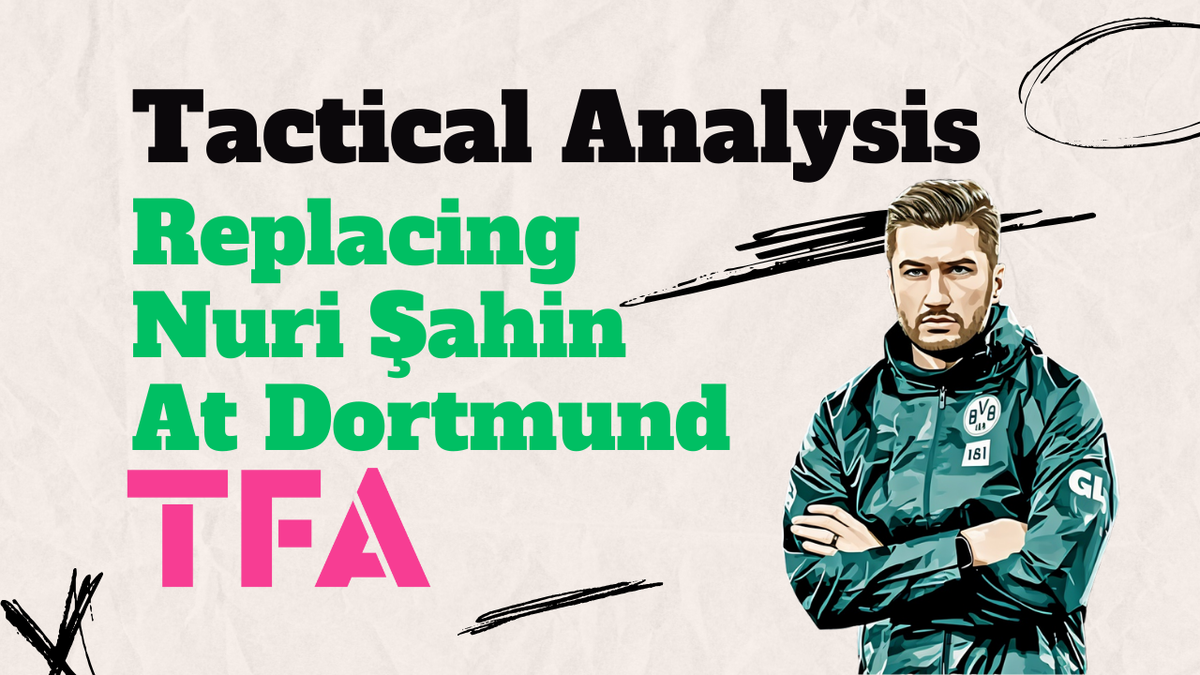
Comments